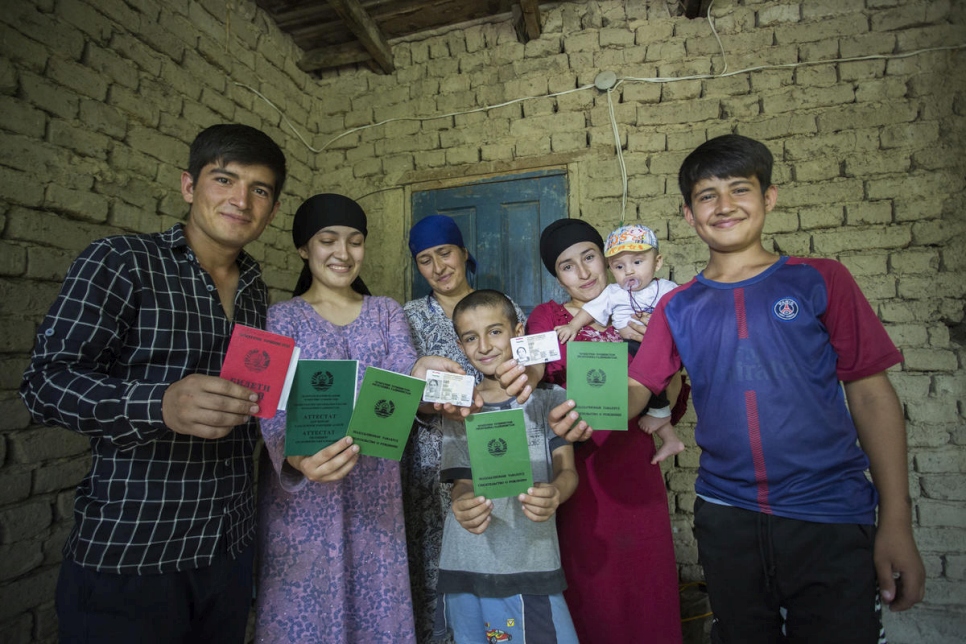A former stateless family shows their newly received identity documents in their home in Dushanbe, Tajikistan. © UNHCR / Didor Saidulloyev
More action is needed to address the plight of millions of people around the world who still do not have citizenship, the UNHCR, the United Nations Refugee Agency, urged today seven years after starting its #IBelong campaign to end it statelessness.
“Significant progress has been made in recent years, but governments need to do more to fill the legal and political loopholes that continue to statelessly millions of people or children born into statelessness,” said UN High Commissioner for Refugees Filippo . Grandi.
Statelessness, or the situation of not being recognized as a citizen by any country, affects millions of people around the world. Stateless persons often do not have access to the most basic rights, including the opportunity to go to school, work legally, access health services, marry or register the birth of a child.
Since UNHCR launched its #IBelong campaign in 2014 to raise awareness and work to end global statelessness, more than 400,000 stateless people in 27 countries have acquired citizenship, while tens of thousands in Asia, Europe, Africa and America have now Having acquired citizenship a path to citizenship as a result of newly enacted legislative changes.
In the past seven years, 29 states have acceded to the statelessness conventions, which signals an increased political will to end statelessness.
“This global dynamic encourages us to fight statelessness, which we can eradicate with concerted efforts by states. But if progress does not accelerate, the millions of people denied citizenship will be stuck in human rights limbo with no access to the most basic rights, ”Grandi said.
Statelessness has many causes, typically due to loopholes or shortcomings in citizenship laws and their implementation. Discrimination – including on the basis of ethnicity, religion and gender – is a leading cause of statelessness.
Because they are not recognized as citizens, stateless persons are often deprived of legal rights or basic services. This leaves them politically and economically marginalized and vulnerable to discrimination, exploitation and abuse. You may also not have access to COVID-19 tests, treatments, or vaccinations, and may have little access to support or protection in the face of climate risks.
Governments have the power to implement legal and political reforms that can help stateless persons in their territory acquire citizenship or prevent statelessness in the first place, sometimes with the stroke of a pen or a relatively simple change in law. It remains an easily avoidable and solvable problem.
UNHCR’s decade-long #IBelong campaign calls on states to end statelessness by 2024.
Background information for editors:
Worldwide, the statistical reporting of the UNHCR counts 4.2 million stateless persons in around 94 countries. Since most countries do not collect statelessness data, the real figure is likely to be much higher.
To date, 96 states are contracting parties to the UN Convention on the Status of Stateless Persons of 1954 and 77 contracting states to the UN Convention on the Reduction of Statelessness of 1961.
Since the start of the #IBelong campaign:
- 1 state of Kyrgyzstan resolved all known statelessness cases and 11 others made progress in resolving serious statelessness cases.
- 17 states have also implemented statelessness determination procedures to identify stateless persons in their territory, with some offering an easier route to citizenship.
- 12 states have put in place procedures to facilitate the naturalization of stateless migrants.
- Fourteen states have changed their citizenship laws to grant citizenship to children born in their territories who would otherwise be stateless.
- 2 States have reformed their citizenship laws to enable mothers to transfer citizenship to their children on an equal footing with fathers.
For more information on this topic, please contact:
Share on Facebook Share on Twitter
https://www.unhcr.org/news/press/2021/11/618387874/unhcr-urges-governments-accelerate-progress-resolve-plight-worlds-stateless.html












/cloudfront-us-east-2.images.arcpublishing.com/reuters/JEUL2B5V7BJCFMRTKGOS3ZSN4Y.jpg)



/cloudfront-us-east-2.images.arcpublishing.com/reuters/DYF5BFEE4JNPJLNCVUO65UKU6U.jpg)

/cloudfront-us-east-2.images.arcpublishing.com/reuters/UF7R3GWJGNMQBMFSDN7PJNRJ5Y.jpg)












